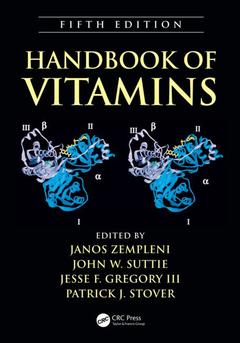Description
Handbook of Vitamins (5th Ed.)
Language: English
Subjects for Handbook of Vitamins:
Keywords
DNA Methylation; Methionine Synthase; Nutrition; Vitamin B6; Genome stability; Cyclic ADP Ribose; Gene regulation; Riboavin Deciency; Epigenetics; DNA Damage; Human; Pantothenic Acid; Vitamins; Biotin Deciency; Biotinylated Histones; ThDP Dependent Enzyme; Vitamin D2; Acyl CoA Dehydrogenase; Fad Synthetase; Methionine Synthase Reductase; Thiamine Deciency; B12 Deciency; SMVT; Retinyl Esters; Vitamin B6 Decient; Niacin Deciency; Thiamine Transport; Histone H3; CDP Choline Pathway; Plasma Retinol; Pantothenic Acid Kinase
590 p. · 17.8x25.4 cm · Hardback
Description
/li>Contents
/li>Readership
/li>Biography
/li>
Within the last few years, knowledge about vitamins has increased dramatically, resulting in improved understanding of human requirements for many vitamins. This new edition of a bestseller presents comprehensive summaries that analyze the chemical, physiological, and nutritional relationships, as well as highlight newly identified functions, for all recognized vitamins. These include vitamins A, D, K, E, B6, B12, niacin, riboflavin, thiamine, pantothenic acid, biotin, folate, choline, and ascorbic acid.
Keeping the tradition of the previous volumes, the Handbook of Vitamins,Fifth Edition provides an updated, contemporary perspective on vitamins in human nutrition. Bringing together leading experts in molecular biology, biochemistry, and physiology, the book contains substantial revisions in every chapter, covering vitamin metabolism, including human requirements, clinical aspects of deficiency, vitamin-dependant cell signals and gene regulation, and roles as coenzymes.
The chapter on epigenetics has been updated and expanded to include novel findings about vitamins not previously considered in studies of nutrient-dependent epigenome modification. The book also contains a new chapter on genome stability, highlighting current understanding of vitamin?genome interactions in the evolution of the human genome and the functional consequences of human genetic variation. Maintaining its status as a high-quality reference, this handbook incorporates new discoveries into an updated and revised fifth edition.
Vitamin A: Nutritional Aspects of Retinoids and Carotenoids. Vitamin D. Vitamin K. Vitamin E. Niacin. Riboflavin (Vitamin B2). Thiamine. Pantothenic Acid. Vitamin B6. Biotin. Folate. Vitamin B12. Choline. Ascorbic Acid. Vitamins, Bioactive Food Compounds, and Histone Modifications. Vitamin–Genome Interactions. Index.
Janos Zempleni, Ph.D., is a Willa Cather Professor of Molecular Nutrition in the Department of Nutrition and Health Sciences at the University of Nebraska–Lincoln (UNL). His research focuses on epigenetic mechanisms by which vitamins decrease the risk for cancer and birth defects. Dr. Zempleni published 82 peer-reviewed papers and 118 review articles, books, book chapters, and symposia proceedings. He is an editorial board member of seven science journals and a regular member of grant review panels in Canada, Germany, Hungary, and the United States. He is the recipient of multiple research awards at the national and local level.
John W. Suttie is the Katherine Berns Van Donk Steenbock Professor Emeritus in the Department of Biochemistry and former chair of the Department of Nutritional Sciences at the University of Wisconsin–Madison. He has broad expertise in biochemistry and human nutrition. His research activities were directed toward the toxicology of inorganic fluorides and the metabolism, mechanism of action, and nutritional significance of vitamin K. He received several research awards, and in 1996, he was elected to the National Academy of Sciences.
Jesse F. Gregory III is a professor in the Department of Food Science and Human Nutrition at the University of Florida. His research has focused on the nutritional properties and metabolic function of B vitamins, especially folate and vitamin B6. Dr. Gregory is recognized for his research dealing with vitamin nutritional biochemistry, particularly the development and application of stable isotopic tracer techniques, metabolic profiling methods, and mathematical modeling to probe human metabolism. Dr. Gregory has received a number of honors including the Centrum Center for Nutrition Science Award from the American Society for Nutritional Sciences.
Patrick J. Stover, Ph.D., is professor and director of the Division of Nutritional Sciences at Cornell Un
These books may interest you

Microbial Biochemistry 158.24 €



